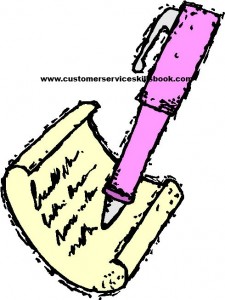Tips for Customer Service Representatives – Nonverbal Communication with Customers
When interacting with customers, it is crucial to remember that many studies have found that nonverbal messages often overshadow verbal ones. This is why customer service representatives should continually remind themselves to guard the unspoken messages they send to customers and potential customers via facial expressions, gestures, posture, appearance, and other unspoken means. Strive to make all forms of communication positive.
To get a better idea of how you present yourself nonverbally to customers, ask a co-worker to use the following guidelines and evaluate your nonverbal communication during a service transaction with a customer. Once it is over, spend some time having your peer provide feedback on how well you did along with any suggestions for improvement.
Body Language – Does your body posture and positioning send a relaxed positive (e.g. confidence and self-assurance) or tense negative (e.g. uncertain, confused, or unconfident)
Facial Expression – Does your face say, “Hello, welcome, I am able and ready to serve you” or does it show a bored, disinterested employee who is going through the motions of providing service?
Eye Contact – Are you making appropriate and adequate eye contact to show interest without causing possible discomfort or offense?
The Tone of Your Voice – Does your voice project a smiling professional who sounds even-paced, comfortable and confident?
For additional ideas and strategies on how to effectively communicate with customers and potential customers, get copies of Customer Service Skills for Success, How to be a Great Call Center Representative and Please Every Customer: Delivering Stellar Customer Service Across Cultures.
About Robert C. Lucas
Bob Lucas has been a trainer, presenter, customer service expert, and adult educator for over four decades. He has written hundreds of articles on training, writing, self-publishing, and workplace learning skills and issues. He is also an award-winning author who has written thirty-seven books on topics such as, writing, relationships, customer service, brain-based learning, and creative training strategies, interpersonal communication, diversity, and supervisory skills. Additionally, he has contributed articles, chapters, and activities to eighteen compilation books. Bob retired from the U.S. Marine Corps in 1991 after twenty-two years of active and reserve service.
Make Money Writing Books: Proven Profit Making Strategies for Authors by Robert W. Lucas at Amazon.com.
The key to successfully making money as an author and/or self-publisher is to brand yourself and your company and to make yourself and your book(s) a household name. Part of this is face-to-face interaction with people at trade shows, library events, book readings, book store signings, blogging or guest blogging on a topic related to their book(s). Another strategy involves writing articles and other materials that show up online and are found when people search for a given topic related to a topic about which the author has written.
If you need help building an author platform, branding yourself and your book(s) or generating recognition for what you do, Make Money Writing Books will help. Bob’s popular book addresses a multitude of ideas and strategies that you can use to help sell more books and create residual and passive income streams. The tips outlined in the book are focused to help authors but apply to virtually any professional trying to increase personal and product recognition and visibility.


